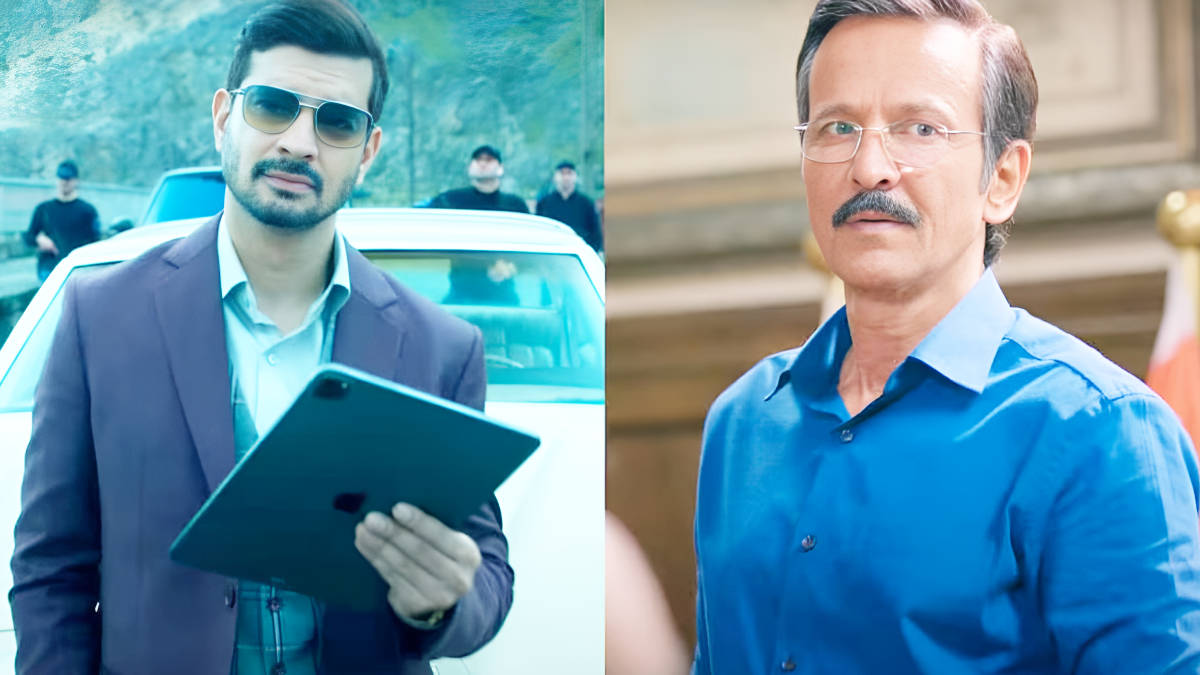Title: Special Ops 2
Director: Neeraj Pandey & Shivam Nair
Cast: Kay Kay Menon, Tahir Raj Bhasin, Arif Zakaria, Karan Tacker, Saiyami Kher, Vinay Pathak, Parmeet Sethi, Prakash Raj, Muzamil Ibrahim, Shikha Talsania, Gautami Kapoor, Kali Prasad Mukherjee, Meher Vij, Dilip Tahil, Tota Roy Chowdhury
Episodes: 7 of about 40-50 mins each
Streaming on: JioHotstar
Plot Outline: When The Enemy Has No Face, Every System Is A Battlefield
When chaos erupts at an international AI tech summit a scientist is kidnapped and a high-ranking Indian intelligence officer is attacked on home soil, it doesn’t take long to connect the dots. The message is loud & clear: India is under ‘silent’ siege—and Himmat Singh must return.
The plot kicks off with the kidnapping of a scientist (Arif Zakaria), who had long warned of AI’s destructive potential. As his disappearance links to a larger cyber offensive, Himmat Singh (Kay Kay Menon) and his globally dispersed team of assets and agents step in to uncover a plot meant to bring India to its knees—without firing a single bullet.
It’s a war of codes, breaches, and digital sabotage. This time, the battlefield isn’t defined by borders or bullets. It’s cyber networks, weaponized algorithms, and stealth attacks on national systems.
And yet, in this digital age spy thriller, something feels missing. It’s slick in concept. But the execution? Not quite.
The Premise: Timely, Terrifying and Technically Complex
Special Ops 2, the latest in Neeraj Pandey’s espionage universe, picks up after the events of Special Ops (2020) and 1.5: The Himmat Story (2021), shifting focus from physical threats to cyber warfare. With themes around AI manipulation, data breaches, and the vulnerability of India’s digital economy, the show is rooted in timely anxieties.
The Hero in the Shadows: Himmat Singh, Reduced to a Silent Commander
In earlier seasons, Kay Kay Menon’s portrayal of Himmat Singh was layered with grit and guile. He was hands-on, drawing from a bag of inventive strategies and espionage flair. In Special Ops 2, however, Menon is curiously static, confined to secure rooms, shifting from one biometric scanner to another, carrying two phones, and delivering instructions with a deadpan expression.
The pulse of the show—the very thrill that came from watching Himmat outmanoeuvre threats—is missing. Instead, the action shifts to his team, who take centre stage in sequences that often feel too conveniently scripted to be thrilling. It’s not that they perform poorly—it’s that the writing doesn’t challenge them enough.
View this post on Instagram
Wasted Potential: Underused Actors and Missed Subplots
The cast is peppered with talent, but some roles are woefully underutilized. Prakash Raj, as Subramaniam, barely gets the screen time he deserves. His commanding presence is reduced to a few scenes, likely trimmed for reasons best known to the makers. Ironically, these limited moments hint at a richer backstory—one that could spark a compelling spinoff exploring Himmat’s training years under Subramaniam’s mentorship.
A subplot involving a fugitive—meant to parallel a real-world high-profile escapee—feels tacked on. It neither adds depth nor urgency and serves mainly as a device to connect the dots toward an easy resolution.
Adding to the list of undercooked elements is the oddly blurred subplot involving Mr. Chaddha (Parmeet Sethi) and Mr. Banerjee (Kali Prasad Mukherjee)—two familiar faces from previous seasons who now find themselves on the opposite side of the table. The shift in allegiance could’ve been a strong narrative twist, filled with moral ambiguity or political manoeuvring, but it never quite gets there.
Their motivations remain cloudy, their arcs underdeveloped, and their eventual placement in the story feels more like a footnote than a reveal. What could have added gravitas and layered complexity instead fades into the background—another missed opportunity.
The same applies to Sudheer Awasthi, played by Tahir Raj Bhasin—an actor capable of delivering layered performances. His character, introduced with potential, is never given the space or depth to evolve. What should’ve been a pivotal figure ends up as a narrative placeholder, neither advancing the plot nor leaving any lasting impression.
Buildup vs Payoff: All Foreplay, No Frenzy
Across six episodes, the show builds up tension—raising stakes, connecting dots, decoding threats. But when the final episode arrives, the anticipated fireworks fizzle. The climax unfolds too cleanly, too quickly. Every thread ties up conveniently, almost like a simulation running on autopilot, perfectly aligned with Himmat’s intent. Where’s the chaos? The resistance? The cost?
For a series premised on high stakes, globe spanning espionage, the lack of real tension in the resolution feels like a letdown.
View this post on Instagram
Loud Sound, Low Impact
The music, usually a strength in thrillers, is overpowering in key moments—especially where action or dialogue should dominate. Instead of elevating tension, it distracts, sometimes even drowning out emotional beats or narrative weight.
A Missed Opportunity from the Neeraj Pandey Universe
Coming from Neeraj Pandey—whose works like A Wednesday, Special 26, Baby, and Rustom still command repeat viewings—the bar was set high. And rightfully so. Pandey understands thrillers like few in the industry. But Special Ops 2 feels like a brilliant concept that never quite makes the leap from paper to screen. The ingredients are all here—AI warfare, slick espionage, geopolitical intrigue—but the screenplay and direction don’t rise to match the potential.
Conclusion:
Special Ops 2 had the potential to be India’s Mr. Robot meets Bodyguard—a cerebral, emotionally grounded cyber-thriller. What it delivers instead is a watered-down, overly polished simulation of one. The idea is powerful, the concept current, and the intent honest. But somewhere between loud background scores and undercooked storylines, the thrill fades.
Himmat Singh may still be the man for the job—but the job, this time, doesn’t do justice to the man.

